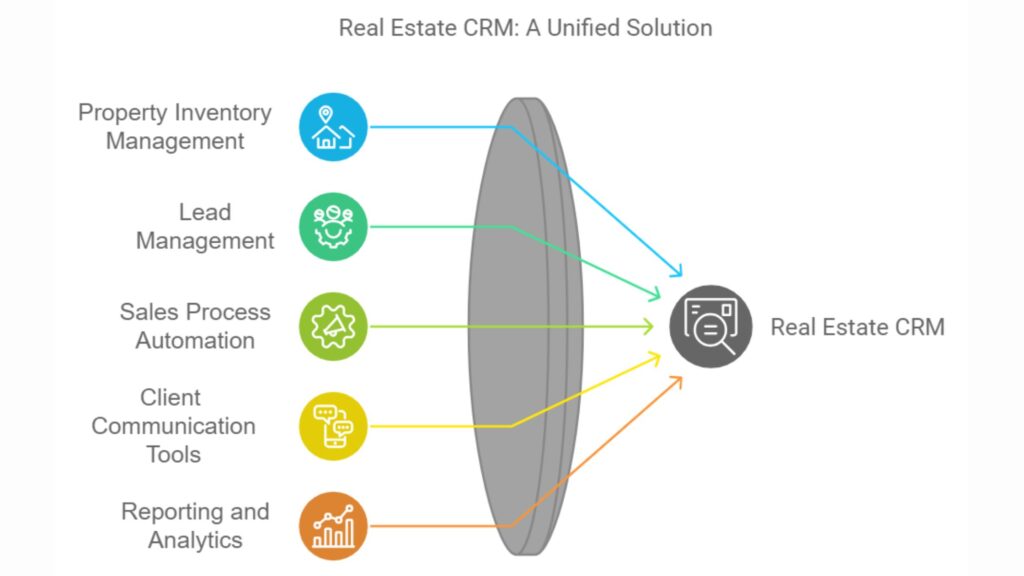
Posted By admin
 Oct 04, 2024
Oct 04, 2024 07:15:40am
07:15:40am In today’s competitive business environment, CRM software is essential for managing customer interactions, automating processes, and providing valuable insights to drive sales. Choosing the right CRM can be a game-changer, especially in real estate, where a targeted approach can make all the difference. While dealing with real estate companies on a daily basis, the question often is Property-xRM vs Other CRMs – how does it compare?
Real estate companies often require tools tailored to their unique operational needs. Whether developers, property managers, or agents, require ready-to-use CRM software to ensure a seamless Sale, Leasing, and Facilities Management process from start to finish.
Property-xRM, powered by Microsoft Dynamics 365, steps in as a powerful ally. It’s more than just software—it’s a tailored solution designed to enhance every aspect of property management. Its intuitive and customizable features enhance productivity and streamline operations for real estate professionals.
Let’s explore how other CRMs compare to Property-xRM and see if it stands out.
Standard CRM solutions are versatile and offer various tools for general business needs, including sales tracking, customer support, and marketing automation. Their features are applicable across various industries, making them a popular choice for businesses looking for a robust, one-size-fits-all solution.
A standard CRM is usually designed to handle a generic customer journey from initial inquiry to closure. For instance, a healthcare provider might use it to track patient interactions and manage appointments, while a financial services firm could adapt it to handle client portfolios and investment tracking. This adaptability allows businesses to tailor the CRM to their needs, enhancing efficiency and effectiveness.
It is suitable for businesses of all sizes. For example, a small start-up might use a CRM to manage a growing list of customer contacts and marketing campaigns, while a large enterprise could scale the same CRM to handle complex sales processes, extensive customer data, and global operations. This adaptability lets businesses start with what they need and scale up as they grow, ensuring the CRM evolves with their requirements.

The CRMs offer third-party integrations to commonly used tools to enhance functionality. For instance, a CRM can integrate with email platforms like Outlook, marketing tools such as MailChimp, and accounting software like QuickBooks. These integrations streamline operations by connecting systems, automating data transfer, and ensuring smooth workflows. They help businesses consolidate tools, boost efficiency, and maintain a unified view of customer interactions and data.
Businesses can customize workflows to meet their unique needs, improving efficiency and productivity. For example, a Salesforce CRM can be customized for a retail company to manage inventory and customer loyalty programs, or for a healthcare provider to handle patient appointments and medical records. This ensures the CRM fits the business’s specific processes, enhancing efficiency and effectiveness.
Let’s imagine a real estate company trying to adopt the same standard CRM for their needs.
Real estate companies might struggle with the lack of industry-specific features in standard CRMs. Such CRM may not include specialized tools for managing property listings, or brokers, or tracking real estate transactions. This can create challenges in handling unit-related details, from listings to inventory availability, and closures. Without automated follow-ups, transaction tracking, and industry-specific reports, the firm may manage these tasks manually.

Customizing a standard CRM for real estate developers and property management companies can be both complex and time-consuming. While a generic CRM often lacks the key features needed for effective property management. Developers must tailor systems to track listings, nurture leads, manage tenant communication, and sync with inventory tracking systems. This process demands time and expertise. Employees may also need significant training, which can slow implementation and temporarily impact productivity.
Extensive customization and industry-specific tool integration can increase costs for real estate companies. A generic CRM may handle lead-to-sale processes but often requires customization for unique features like call histories and insights. Additionally, integrating the CRM with ERP systems and payment software adds complexity and expense. These customizations and integrations demand specialized development, significantly raising both initial and ongoing costs.
“This is where knowing about Property-xRM vs Other CRMs is important.”
Real estate-specific CRMs are designed from the ground up to meet the unique challenges of real estate operations. These platforms come with pre-built features that cater specifically to real estate developers, homebuilders, agents, and brokers, making them far more efficient and effective for real estate operations.
Let’s go through some key features of Real Estate CRM:
A real estate CRM records property details, tracks inventory, and manages contracts and communications in one place. This enables the team to efficiently handle property details, monitor inventory progress—such as reserved, blocked, or available units—streamline document management, and provide a visual representation of the inventory stacking plan. Inventory management ensures that all aspects of property transactions are organized and easily accessible.
A real estate CRM helps teams capture leads from various sources such as online inquiries, project launches, social media, or open house tradeshows. For example, during a new property launch, leads can be an invited list of VIP Contacts. This would follow a specific flow where a queue management system and a token system may be needed on the day of the event.
In other cases, automated follow-ups, such as emails and calls, can be scheduled based on the lead’s sales pipeline stage, ensuring timely communication and engagement. The CRM also categorizes leads as hot, warm, or cold, allowing teams to prioritize potential prospects and preventing duplicates for better data integrity.

Automates real estate operations such as contract management, booking, and payment schedules. For example, it can automate the process of generating and managing contracts for new property deals, schedule property viewings and follow-ups, and track payment plans and due dates. This streamlines the workflow, reduces manual administrative tasks, and ensures the timely execution of all sales-related activities.
A Real Estate CRM offers specialized email templates designed for industry-specific scenarios. In such cases, having the right data and fields in the CRM becomes important. For instance, after a property showing, it can automatically generate a follow-up email thanking the client and by providing additional property details. These templates also help respond to inquiries and schedule future viewings seamlessly. By streamlining communication, real estate professionals can ensure consistent, professional interactions with clients, fostering stronger relationships and enhancing conversion rates in a competitive market.
Provides dashboards that display real-time data on property sales, track current inventory levels, and analyze market trends. The reporting and analytics help real estate professionals make informed decisions by offering insights into sales performance, inventory turnover, payment collections, and forecasts.
Property-xRM – Microsoft is a CRM software tailored specifically for property management, addressing the unique needs of homebuilders, commercial property managers, and retail owners. It offers features designed to manage real estate-specific aspects such as property listings, client inquiries, inventories, leads, and more.
For example, native connections with Power BI provide advanced data analytics and reporting tailored to real estate needs, helping users make informed decisions based on real-time data
By investing in Property-xRM, companies automatically invest in the Microsoft Ecosystem. It integrates seamlessly with Dynamics 365 and commonly used programs like Excel, Word, and PowerPoint, as well as Office 365 and Power BI. Microsoft Teams and Outlook ensure all communications and meetings are synced with the cloud CRM.
Unlike most real estate software, Property-xRM prioritizes the customer journey by leveraging the operational CRM engine. This allows users to nurture conversations with prospective owners and tenants within a single solution.
For example, the property manager can track a tenant’s journey from inquiry to lease signing, maintain detailed contact information, send personalized follow-up emails, share lease proposals, and handle rent payments. This integration provides a smooth experience for both tenants and property managers.

Real estate professionals can finalize deals from anywhere. Teams can easily create a mobile app on the Power Platform using no-code/low-code capabilities. With a unified interface, agents are empowered to access information on multiple devices with the exact same look and feel.
For example, an agent can use the mobile app to review property details, send contract documents for e-signature, and process payments while on-site with clients or traveling. This flexibility ensures that agents can close deals quickly and efficiently, no matter where they are.
Property-xRM is pre-configured with features tailored for real estate, including lead, inventory, broker, and preference management for sales, leasing, facilities management, owner association, and community management. With flexible payment plans, this specialization reduces both time and costs related to customization.
For instance, an agent can match potential buyers with the right properties by capturing and organizing their preferences, such as location, budget, and property type. This enables agents to quickly find and recommend suitable properties, leading to faster sales and increased customer satisfaction.
With Microsoft’s robust security framework, Property-xRM ensures that your data is protected and compliant with industry regulations. This is a critical factor for real estate firms that handle sensitive client information and financial transactions.
Property-xRM, powered by Microsoft, offers a blend of real estate-specific features with the robust capabilities of Microsoft’s technology stack. This unique combination sets it apart from other CRM solutions in the market, both general and real estate-specific.
While there are other real estate CRM solutions built on platforms like Salesforce or Zoho, Property-xRM’s integration with the Microsoft ecosystem gives it a distinct edge. Here’s how it compares:
Choosing the right CRM is vital for your real estate business. Standard CRMs provide broad functionality but may not meet the specific needs of real estate professionals. In contrast, real estate-specific CRMs like Property-xRM provide tailored features that streamline operations and enhance productivity. Ultimately, the choice depends on whether you prioritize general business processes or industry-specific requirements.
What truly sets Property-xRM apart is its integration with the Microsoft ecosystem, offering a unique blend of industry-specific customization, scalability, security, and flexibility. Whether you’re a real estate developer, homebuilder, or property management company, Property-xRM is designed to meet your needs and help your business thrive in a competitive market.
Property-xRM tailors its features for residential sales, residential leasing, commercial leasing/ retail leasing, facilities management, homeowners association, and community management.


